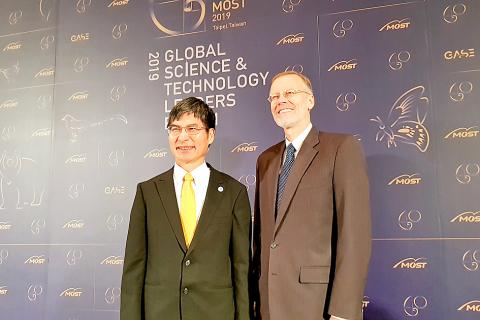The American Institute in Taiwan (AIT) and the French Office in Taipei yesterday expressed their hope to boost ties with Taiwan through technological collaboration and talent cultivation, and both hailed semiconductors and innovation as Taiwan’s strengths.
The two-day Global Science and Technology Leaders Forum, organized by the Ministry of Science and Technology, opened yesterday at the Mandarin Oriental Taipei (文華東方酒店) hotel, and nearly 300 participants from Taiwan and 18 other countries attended.
In a speech, AIT Director Brent Christensen helped mark the ministry’s 60th anniversary, telling the forum that Taiwan is a critical link in global technology supply chains.

Photo: Chien Hui-ju, Taipei Times
Christensen also alerted people to the challenges of the new digital age.
China’s market-distorting subsidies, intellectual property theft and talent poaching threaten a rules-based economic order, he said, calling for closer ties among like-minded partners to push back against Beijing.
The US and Taiwan have launched the Talent Circulation Alliance to facilitate educational and professional exchanges, with a summit scheduled for Tuesday next week, he said.
French Office in Taipei Director Jean-Francois Casabonne-Masonnave said that artificial intelligence (AI), entrepreneurship and talent exchanges are primary opportunities for further France-Taiwan collaboration.
“AI is a priority for our President [Emmanuel Macron] and is a very fertile ground for scientific cooperation between France and Taiwan,” he said, expressing the hope that more Taiwanese students would pursue scientific and engineering training in France.
An example of bilateral collaboration is the Franco-Taiwanese Scientific Grand Prize, which has been awarded annually for more than 20 years, he said, adding that French National Centre for Scientific Research chairman Antoine Petit is expected to visit Taiwan in the spring.
The US remains Taiwan’s primary partner in technological cooperation, and the talent cultivation initiative aims to bring more young people to the international stage, Minister of Science and Technology Chen Liang-gee (陳良基) told reporters.
Taiwan-France collaboration in technology has a history of more than 20 years, while the two nations exchanged six start-up teams this year, Chen said.
The ministry has also established 12 overseas research centers across Southeast Asia, where it is helping countries install disaster prevention systems, he added.
Asked what idea he would share at the forum, Albert Liu (劉峻誠), founder and CEO of Kneron Inc (耐能), one of the developers of Edge AI solutions, said he hopes that the Taiwanese government can relax certain regulations to facilitate AI development.
Many public security and financial systems employ AI, but Taiwan’s relatively conservative regulations in those fields impose barriers on larger-scale innovation, he said, citing the government’s requirement that shareholders provide their identity documents.

The CIA has a message for Chinese government officials worried about their place in Chinese President Xi Jinping’s (習近平) government: Come work with us. The agency released two Mandarin-language videos on social media on Thursday inviting disgruntled officials to contact the CIA. The recruitment videos posted on YouTube and X racked up more than 5 million views combined in their first day. The outreach comes as CIA Director John Ratcliffe has vowed to boost the agency’s use of intelligence from human sources and its focus on China, which has recently targeted US officials with its own espionage operations. The videos are “aimed at

STEADFAST FRIEND: The bills encourage increased Taiwan-US engagement and address China’s distortion of UN Resolution 2758 to isolate Taiwan internationally The Presidential Office yesterday thanked the US House of Representatives for unanimously passing two Taiwan-related bills highlighting its solid support for Taiwan’s democracy and global participation, and for deepening bilateral relations. One of the bills, the Taiwan Assurance Implementation Act, requires the US Department of State to periodically review its guidelines for engagement with Taiwan, and report to the US Congress on the guidelines and plans to lift self-imposed limitations on US-Taiwan engagement. The other bill is the Taiwan International Solidarity Act, which clarifies that UN Resolution 2758 does not address the issue of the representation of Taiwan or its people in

US Indo-Pacific Commander Admiral Samuel Paparo on Friday expressed concern over the rate at which China is diversifying its military exercises, the Financial Times (FT) reported on Saturday. “The rates of change on the depth and breadth of their exercises is the one non-linear effect that I’ve seen in the last year that wakes me up at night or keeps me up at night,” Paparo was quoted by FT as saying while attending the annual Sedona Forum at the McCain Institute in Arizona. Paparo also expressed concern over the speed with which China was expanding its military. While the US

SHIFT: Taiwan’s better-than-expected first-quarter GDP and signs of weakness in the US have driven global capital back to emerging markets, the central bank head said The central bank yesterday blamed market speculation for the steep rise in the local currency, and urged exporters and financial institutions to stay calm and stop panic sell-offs to avoid hurting their own profitability. The nation’s top monetary policymaker said that it would step in, if necessary, to maintain order and stability in the foreign exchange market. The remarks came as the NT dollar yesterday closed up NT$0.919 to NT$30.145 against the US dollar in Taipei trading, after rising as high as NT$29.59 in intraday trading. The local currency has surged 5.85 percent against the greenback over the past two sessions, central